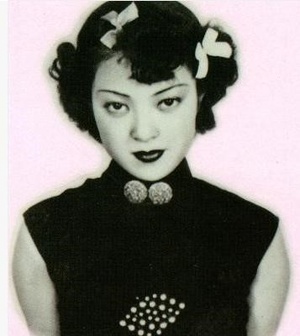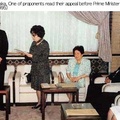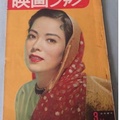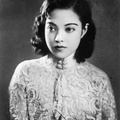In each of the previous chapters, we have seen young Yoshiko get a few tastes of the real political world around her: the killing of a Chinese bandit, witnessed from her window; the massacre of an entire town to avenge the burning of a coal mine; and the local police’s wrecking of her best friend Liuba’s home.
Consider for a moment the forces tugging from all directions at the girl’s psyche: her father’s demand that she become a solid bridge of understanding between the Chinese and the Japanese; masquerading as Chinese and being imposed upon a Chinese family; enrolling at Jiyiao Academy, an exclusive school for rich girls with an all-Chinese curriculum; and realizing how brutal and spiteful the Japanese authorities were toward the Chinese. These stresses were the price she had to pay to become a top China expert, ready to succeed at the highest level in just three years. Wouldn’t this be enough to drive any of us mad?
While waiting to move to Beijing, Yoshiko kept searching for Liuba and her parents. Had anyone seen them lately? Did anybody know where they lived? All of her in-person and phoned inquiries received the same response: But aren’t you her best friend? One should be asking you…
Beijing 1934-38
Yoshiko was now 14 years old, inexperienced, and quite attractive. Since her father had to tend to other obligations and her mother had to stay home with the other children, she would have to travel to Beijing alone. “You are a Chinese girl now—travel as the Chinese do. I’ll meet you at the Beijing station,” her father advised.
On the long journey across the Manchurian steppes, beset with both miserable weather and rebel gangs, Yoshiko sat not in the soft-seat section reserved for foreigners and members of the upper class, but in the commoners’ hard-seat area, which was littered with garbage and filled with stench.1 It was lonely too; Yoshiko had to avoid befriending anyone, for even a small slip of the tongue could reveal her Japanese identity and place her in serious jeopardy. To make things worse, she had to carry a large sum of Manchukuo money to deliver to her father in Beijing. She made small bundles of the bills and tied them strategically to her body so nobody could detect them.
Yoshiko left Fengtian on a miserable, rainy night that preceded a severe storm. Near midnight, the train had to stop at Sanhaiguan, the border between Manchukuo and Northern China. A detachment of Nationalist soldiers boarded and began confiscating all the Manchukuo money that travelers carried; one man who tried to escape was brutalized and robbed. After seeing that, Yoshiko hid in a foul-smelling toilet until the train resumed its trip. In Beijing, her father met her as promised and took her to the Pan family’s huge estate, where she would become their adopted daughter Pan Shuhua.
Yoshiko soon enrolled at Jiyiao Academy, where she found that her Chinese classmates carried themselves quite differently than she did; they were chatty, inattentive, and rude to their teachers. To conceal her Japanese identity, she avoided interacting with her classmates, which gave the impression that she was a timid, provincial kid.
At home, Mrs. Pan worked to polish Yoshiko’s language and manners, offering such advice as:
- You smile too much; that may make you look stupid.
- You bow too deeply; we consider that servile.
- Chinese girls do _____, but don’t do _____.
The enormous Pan family estate housed over 100 persons, none of whom spoke Japanese. The day soon arrived when, upon meeting Yoshiko, one could easily take her to be a young Beijing native—albeit one who was perhaps a little on the proper side.
The only social responsibilities of the Pan girls were to serve tea to Mr. Pan and his guests, and prepare the opium pipes for the host and his visitors. Yoshiko often wondered how important people, such as the distinguished politician Pan Yugui, could indulge in such a filthy habit.
Meeting “the Other Yoshiko”
Chinese resistance against the Japanese became full-blown in Beijing, which was a major concern for Yoshiko’s family back in Fengtian. When Mr. Pan, an open collaborator with the Japanese, became Mayor of Tianjin, a coastal city barely 70 miles away, Yoshiko’s parents feared for her life and pressed her to return home. More assertive now, Yoshiko insisted on completing her schooling. Fumio asked his friends, members of the Japanese Intelligence Service, to visit the Pan home often and keep an eye on his daughter.
When Yoshiko turned 17, her father came to Beijing and took her to Dongxinglou, a famous eatery in the Tianjin Japanese concession. He introduced her to the owner, Yoshiko Kawashima, with whom our Yoshiko soon developed a close bond. Kawashima was already over 30; she insisted on calling her new friend Yoko-chan, and asked in turn to be called Onii-chan (honorable brother)2. The younger Yoshiko admired and envied Kawashima’s wild lifestyle, and even attended a few of her parties, but never felt fully comfortable at them.
Kawashima Yoshiko gave me the opportunity to feel emancipated from the regimented routines at home and at school, although what really surrounded her was an air of perverse degradation and self-abandoning decadence…3
The day came when Pan Yugui gave his adopted daughter a generous tongue-lashing, forbidding her from further associating with Kawashima. Army Intelligence Major Yamaga Toru, a close family friend, joined the scolding choir, and strongly urged a prompt end to all contact with Kawashima. The break was easier for Yamaguchi than for Kawashima, who circulated a couple of nasty rumors about our heroine.4
In 1938, Jiyiao Academy was dynamited by Chinese rebels, just two months before Yoshiko was to graduate. Plans to rebuild the school or move it to another location were uncertain, and there were no formal graduation exercises that year. Nonetheless, Yoshiko and her cohort were granted their diplomas. Although the time had come to determine what to do with their young lives, thinking about a future in China seemed like a waste of time in that agitated climate.
Meanwhile, the success of that young singer of new melodies from Manchuria kept growing. Every time Yoshiko traveled back to Fengtian to stay with her parents, she would record a string of newly arranged Chinese songs. And now, thanks to the establishment of a large broadcasting station in Xinjin, Manchukuo’s capital, her voice could be heard all over Manchuria.
A New Star is Born
In the summer of 1937, Manchukuo and the South Manchurian Railway became partners in a cooperative agreement to support the Japanese-Manchurian friendship effort—in other words, the political goals of Japan for the area. They created the film company Man’ei to make commercial movies loaded with propaganda clichés. After producing a couple of dramas that did well, Man’ei was planning a musical in which the lead actress would also sing in a few scenes. The rest of the cast was already in place, awaiting a leading lady. Makino Mitsui, Man’ei’s production manager, happened to hear one of Li Xianglan’s programs and asked the Japanese Military Press Division to help her get in touch with Yoshiko.
Providentially, Major Yamaga became involved in the process. He knew Xianglan quite well, since she was the daughter of his best friend Fumio. One fateful day, Yamaga took Yoshiko to his favorite restaurant, where he introduced her to Minoru Yamanashi of the Manchurian Film Association.
Yoshiko was perfect for the role; she was young, beautiful, fluent in Mandarin, already a public favorite with a beautifully trained voice, and Japanese to the core. Wouldn’t she take it on for the sake of Japanese-Manchurian friendship? After all, it would just be a few songs...
Curious about how Manchukuo had changed, Yoshiko jumped at the opportunity to see her family, study under Mme. Podlesov again, show off her mastery of Mandarin to General Li and his family, and have some fun in that world that fascinated everybody—the movies! Of course, just a few songs wouldn’t demand too much. She caught herself nodding her approval almost automatically.
At Xinjing station, the entire top management of Man’ei came to greet her. Yoshiko had no idea that she had been virtually railroaded into Man’ei’s5 treasure shed6. After a grueling screen test, the new star was still wondering what was going to happen. The “few songs” hadn’t materialized and there was still more filming to do.
Two days later, she was on a train filming scenes for her first movie: Honeymoon Express, featuring a scene of the newlyweds in their pajamas.7 Yoshiko complained to Makino, the producer. He assured her that everything was okay because she was the star of the film: “Be a good girl and leave everything to me,” he said.
Meanwhile, conscious of what the company had found, Major Yamaga was at Fengtian, working on convincing Yoshiko’s parents to sign a contract for her to become an exclusive star for Man’ei—all for the sake of the nation, as he put it. Her parents signed and Li Xianglan was on her way to stardom.
There was a lot for Yoshiko to learn in this new world. The company expected her to be proficient at acting, speaking Japanese and Mandarin, dancing ballet, and performing martial arts; she was also expected to be familiar with classical Chinese literature and poetry. For her efforts, she was paid 250 yen per month—more than four times what a male Japanese university graduate would normally get. She was housed in a hotel and given the services of an attendant.8
Step by step, Man’ei had become the largest, best equipped, and most technically competent studio in all of Asia, modeled after the Germany’s Universum Film Aktiengeselschaft9 compact. After Honeymoon Express came the satire The Spring Dreams of Great Fortune and the supernatural adventure Retribution of the Vengeful Spirit.
In 1938, Li Xianglan (or “Ri Koran” in Japanese) made her first trip to Japan as the Manchurian beauty who had made it big in Japanese-produced films. She had her first personal encounter with Japanese prejudice shortly after debarking in Shimonoseki. The police officer inspecting the passports of the new arrivals gave her a humiliating tongue-lashing for being dressed in a Chankoro dress10 and speaking in their language.
This was, then my first encounter with Japan, the country of my dreams.
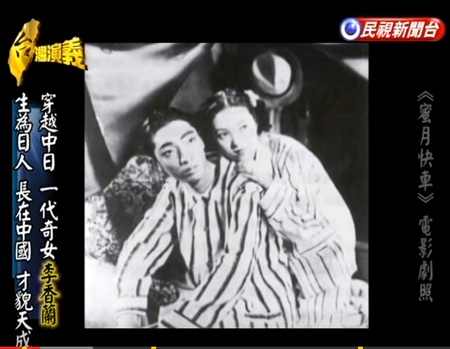
Notes:
1. Yamaguchi, 32-33. The South Manchuria Railway lines were the fastest and most efficient in China. The gauge had been modernized for better stability; the engines were the most modern Baldwin models produced in America, lovingly cared for by the Japanese engineers; and the deluxe accommodations were even better than those of some of the most famous European railroads. The service was almost always on time, since the trains were capable of traveling up to 147 mph on the steppes. The cheaper sections, however, were as filthy and distasteful as the decaying sections of any city or town.
2. The notorious Yoshiko Kawashima was a Manchurian princess of the Qing Dynasty who had grown up as a Japanese, and was presently was in the Japanese Secret Service. She was touted as the Manchurian Joan of Arc for her obsession with restoring the Qing to power. She felt that dressing and acting as a male would give her greater power.
3. Yamaguchi, 57.
4. “Children of the Sun,” The Newsette, ESGVJCC, April 2016. Kawashima was furious about Yamaguchi “stealing her boyfriend Major Yamaga,” something that never really happened.
5. For the enjoyable details of her screen test, and the filming of her first movie, see Yamaguchi, 66-7.
6. Since Man’ei’s formidable main studio was still under construction, the company operated in a primitive shed converted from a railroad structure, on the outskirts of Xinjing. Ibid, 69-70.
7. While there were no problems with female nudity or with male actors appearing in their most minimal underwear, there were taboos against appearing in public in one’s pajamas.
8. Yamaguchi, 75-80.
9. The UFA was a large film production company acquired by the Nazis as part of their extensive propaganda operations. It was converted into the most formidable film producer in Europe, and perhaps the entire world, during the 1930s.
10. Chankoro is derived from the Taiwanese Chen-kok-loh, a pejorative term that roughly translates to “Chinaman” or “Qing Dynasty slave.”
11. Yamaguchi, 82.
© 2017 Ed Moreno


